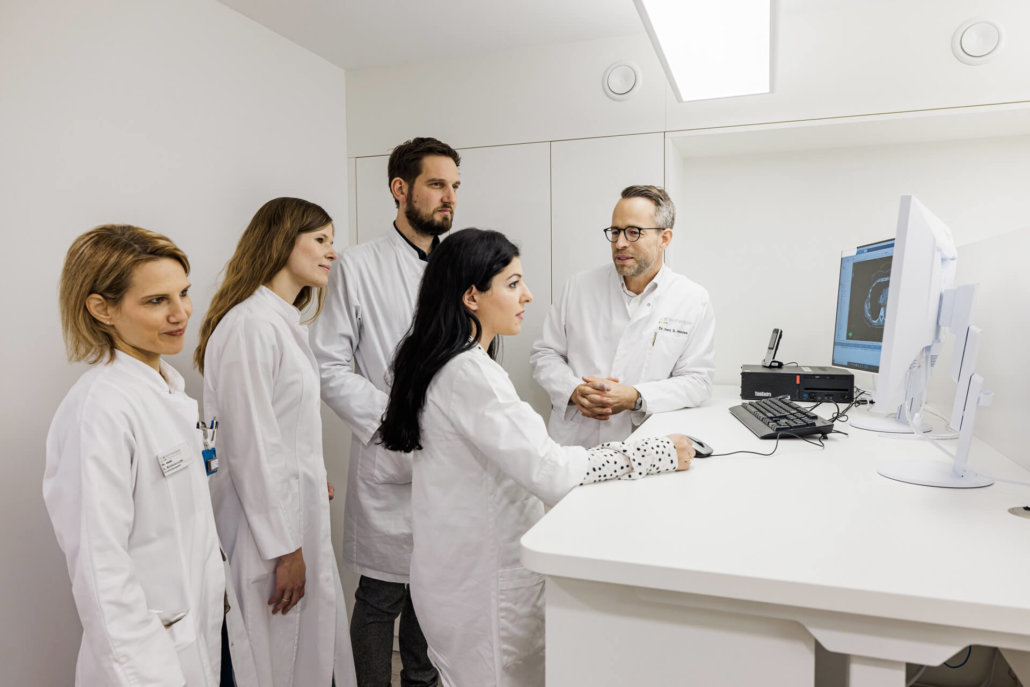Uterine cancer – good prognosis prospects
The uterine cancer is very often detected at the earliest possible stage I. As a result, survival rates are very high in relation to other types of cancer, but also to other countries (surveys by the Robert Koch Institute). Treatment by chemotherapy or surgery is often combined with adjuvant radiation therapy for successful treatment.
1 from 50
Women fall ill in the course of life
approx. 78 %
relative survival rate after five years
approx. 70 %
of all uterine tumors are stage I
Where can you have uterine cancer treated in Munich?
Uterine cancer (endometrial cancer) can be treated with the help of various procedures. The team of Radiologie München develops an individual treatment plan for uterine carcinoma according to the patient’s state of health in close cooperation with doctors from other disciplines. Result for you: Your best possible therapy! Choose one of our locations and discuss everything with our specialists.

Causes of uterine cancer
The causes of uterine cancer are not yet fully understood. The female sex hormone estrogen is considered an important trigger when it is present in the body for a particularly long time or in high concentrations.
This problem can occur, for example, with particularly early onset of the first menstruation. Late menopause also alters the concentration of estrogen on the endometrium. In addition, there are certain risk factors:
- Prolonged use of estrogen (without additional use of progestin as protection).
- Presence of a combination of severe obesity, high cholesterol, high blood pressure and disorders of sugar metabolism
- Diabetes mellitus
- Polycystic ovary syndrome
- Breast cancer (mamma carcinoma) and taking the active substance Tamoxifen, which is used to treat breast cancer.
- HNPCC syndrome (hereditary form of colorectal cancer)
Another point is high age. Statistically, it is mainly women over the age of 60 who develop endometrial carcinoma.
Treatment of uterine cancer
Decisive for the choice of the right therapy method is the classification of the tumor stage and whether and to what extent the cancer has already spread to other organs or lymph nodes. The main procedure for treating this type of cancer is surgery. After surgery, a decision is made based on the stage of the cancer and the risk of recurrence as to whether chemotherapy, radiation therapy or hormone therapy will be used as supportive measures.
Radiotherapy
Similar to adjuvant chemotherapy, radiation is used to prevent cancer cells from spreading after surgery. Radiation therapy can be delivered in two ways: from the inside and from the outside. External radiation(teletherapy) is mostly used when the risk of recurrence is very high or previous surgery does not allow internal radiation. Internal radiation(brachytherapy) is preferred when the risk of recurrence is lower and only strictly localized.
In the case of irradiation from the inside, the radiation sources are inserted into the vagina or uterus for a short time and then removed. The radiation source, a radionuclide with a short-distance radiation, works particularly well on localized tumors. In external beam radiation, the advanced tumor and its metastases are treated with high-energy radiation. An accelerator generates high-energy beams that irradiate the tumor from different directions through the skin.
Operation
During the operation, the patient’s uterine body, cervix, fallopian tubes and ovaries are removed. If the tumor is already far advanced or has already spread to adjacent tissue, this must also be removed. The same applies to the lymph nodes. The aim is to remove all cancer cells from all affected tissues.
It is crucial for further treatment to classify the tumor correctly after surgery: Staging is done according to the TNM system, FIGO classification and tumor type. Based on this diagnosis, chemotherapy, radiotherapy, endocrine therapy or a combination of these methods may be used.
Chemotherapy
Adjuvant chemotherapy is only used from advanced endometrial cancer onwards, when the cancer has already affected surrounding tissue. The cytostatic drugs used inhibit the cell growth of the remaining cancer cells and prevent the cancer from spreading further in the body and forming metastases. In this way, the risk of relapse is reduced.
Chemotherapy and radiotherapy can also be used in addition to adjuvant treatment if surgery is not an option for the patient. In palliative therapy, it provides patients with relief by reducing pain or stopping bleeding.
Hormone therapy
In addition to chemotherapy or radiotherapy, endocrine therapy can also be used to stop the cancer from spreading in the body. Treatment is via high-dose progestins. These inhibit the hormone oestrogen, which reduces the spread of cancer from the uterine lining.
What is the treatment process in our practices?
What do you need to pay attention to before, during and after treatment?
After the treatment of cancer of the uterus, rehabilitation and aftercare are on the patient’s agenda. These measures help women return to daily life and monitor the success of treatment. This allows relapses to be found early and treated efficiently. Please ask your attending physician about these measures.
The therapy and its consequences can affect the psyche. Removal of the uterus, fallopian tubes, ovaries and cervix can mean saying goodbye to a desire to have children. Therefore, it is essential that you discuss this issue with your doctor. He can provide you with information and addresses where you can get help from qualified contacts.
The treatment can be very stressful for many women. A healthy lifestyle is crucial for well-being and the success of the therapy: Eat a balanced diet, get enough exercise in the fresh air and please refrain from smoking and alcohol as far as possible.
What are the side effects of uterine cancer treatment?
The treatment plan is individually tailored to the patient that the cancer is treated in the best possible way. At the same time, the therapy should not be particularly stressful for the patient. Nevertheless, side effects can occur with the individual treatment measures.
If the patient has her reproductive organs removed during surgery, she becomes infertile. Therefore, they should discuss with their treating physician which alternative treatment options may be considered that do not stand in the way of a desire to have a child.
Chemotherapy and radiation therapy affect blood formation, which is why there may be an increased susceptibility to infections and fatigue. Furthermore, nausea, diarrhea, inflammation of the bladder and intestines, and of the skin and mucous membranes may occur with this treatment.




